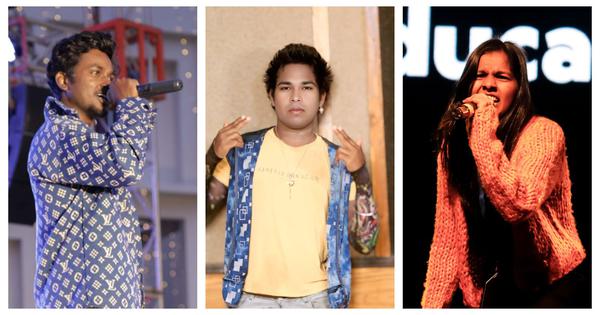
Mahi G, 28, is from Ahilyanagar in rural Maharashtra. Dule Rocker, 27, is from Kalahandi, Odisha. Aman Kachhap, 27, was born in Jharkhand.
The three of them are using rap to tell stories that mainstream Indian pop has long ignored – of caste injustice, climate catastrophe, displacement and other resonant social themes.
Drawn from groups that have long been marginalised, they are using rhythm and rhyme to carry the sound of rural India and everyday survival to larger audiences.
This is what they had to say about art and activism.
Mahi G: Turning poems into protest
Mahi G, born Madhura Ghane, is a member of the Mahadev Koli Adivasi community. She said that her rap was born not from imitating other hip hop musicians but from poetry.
She drew from her community’s struggles against environmental destruction, forced displacement and marginalisation and poured the material into poems she wrote as a college student. She began transforming them into rap during the farmers’ protests of 2019-’20.
Focussing on the here and now is vital to her. “Before going to the moon, think about saving the earth,” she said.
Her debut track Jungle Cha Raja (King of the Jungle), released in 2021, is rooted in the Adivasi tenets of jal, jangal, jameen (water, forest, and land), the foundations of community life and survival.
The video for the track was shot in her village, where Mahi performed in her grandmother’s traditional attire, the lugat-choli, linking personal memory with community struggle.
Since then, Mahi G has released eight songs, more than half centred on environmental and social justice. Among them is Haq Se Hijda Hu, a track that shines a light on the resilience of India’s hijra community.
Her most recent single, released in June was titled Heatwave. Produced in collaboration with Greenpeace India, it highlights how rising temperatures disproportionately endanger outdoor daily-wage workers such as brick-kiln labourers and sewage cleaners.
Mahi funds her music through her job as a software engineer and has chosen not to monetise her YouTube channel.
“Our people do not see struggle as struggle,” she said. “They see it as life.”
Dule Rocker: From lockdown anger to regional stardom
In Kalahandi district, Duleshwar Tandi – ‘Rapper Dule Rocker’ – a tuition teacher, construction worker and occasional migrant, expresses anguish through this song at the plight of migrants in the lockdown. @DuleRocker pic.twitter.com/3uVc9g4soD
— People’s Archive of Rural India (@PARInetwork) July 8, 2020
Dule Rocker’s path into music began with an upheaval. Born Duleshwar Tandi in Borda, a village in Kalahandi, Odisha, the 27-year-old Dalit rapper had been working in Raipur as a waiter and dishwasher. Just before the Covid-19 lockdown in 2020, he returned home.
What he witnessed over the following weeks seared him: thousands of migrant workers walking hundreds of kilometers, barefoot and hungry, often carrying children.
In his village home, with only a basic mobile phone, Dule Rocker began to rap. There was no professional equipment – only urgency. His verses were raw and unfiltered, capturing political neglect, poverty, and everyday struggle. His song Sarkar Javab De (The Government needs to Answer), released in 2020, spread online and drew listeners from across India.
But Dule soon realised that revolutionary rap could not sustain him. He began experimenting with themes of love and celebration, which resonated widely in Odisha. Today, he owns a small studio and is something of a regional celebrity. He is invited to weddings and village gatherings, and people stop him on the street.
On a recent video call, he showed us his beautiful house, complete with a tulsi plant his mother worships daily, and the small studio he has set up in his room. His dream is to save enough money to return to making uncompromising political rap.
Asked what he’d do if he had to choose between a hypnotic beat and the truth, he said with a smile: ‘I am a music composer and producer, I can mix both.’
Aman Kachhap: Reclaiming stigma through rap
For Aman Kachhap, rap is rooted in the quest to reclaim dignity. The Jharkhand-born artist from the Oraon tribe, recalls being bullied as a child when classmates called him a “Naxalite”.
Back then it was an insult. Later, while studying at St. Xavier’s College in Ranchi 2015, he began learning about tribal history and movements. That was when the word shifted meaning. “As a child it was a stigma, but later I understood this label also carries a history,” he said.
During the lockdown of 2020-’21, Aman turned that discovery into music. His breakout track Naxali reclaimed the slur and turned it into a declaration of pride. Sung in Nagpuri, it challenged stereotypes and urged young people to embrace their identity.
Other songs such as Jatra Lagao and Dhemni continued the blend of traditional Nagpuri beats from the Chota Nagpur plateau in Central India with hip hop rhythms, sometimes borrowing African drum samples. “Nobody listens to protest speeches, but everyone listens to music,” Kachhap explained.
Kachhap draws inspiration from a variety of figures: the folk legend Madhu Mansuri Hasmukh and scholar-musician Ramdayal Munda, who both used music to strengthen Jharkhand’s Adivasi identity; and above all, Birsa Munda, the 19th- century freedom fighter revered by the Munda tribe as Dharti Abba (Father of the land).
A psychology student, Kachhap aspires to pursue his PhD. His dream project is to revive Paika martial folk dance (a folk art performed by Munda tribe in Jharkhand) through rap-infused stage performances. “Art has no boundaries,” he said. At the same time, he is pragmatic about the limits of activism. “To do social service, you need money in your pocket.” Kachhap said.
Ultimately, his vision is clear: to carry forward Birsa Munda’s dream through music. “I want people to say after hearing my rap – yes, we are proud of our land and our identity.”
The work of Mahi G, Dule Rocker, and Aman Kachhap is infused with the conviction that rap can serve as resistance and as record. Their music archives experiences that history books often overlook.
Meenakshi Narayanan is a climate change researcher and consultant at a global consulting firm. Tanya Mittal is a Delhi-based policy researcher and writer who has studied at Lady Shri Ram College and the Tata Institute of Social Sciences.
📰 Crime Today News is proudly sponsored by DRYFRUIT & CO – A Brand by eFabby Global LLC
Design & Developed by Yes Mom Hosting






